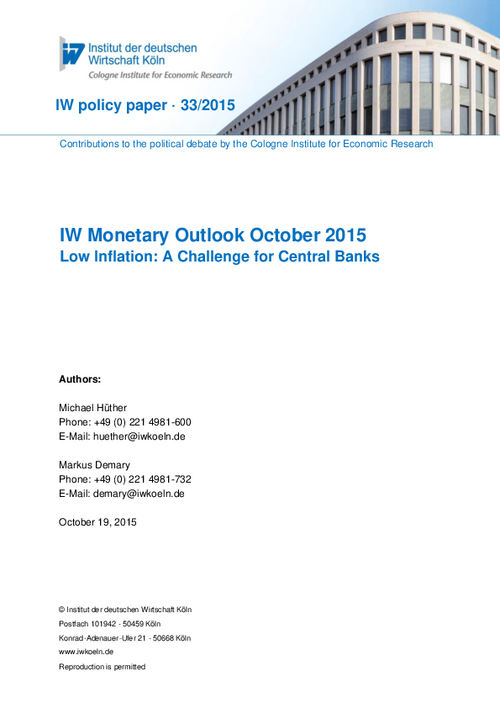Low Inflation: A Challenge for Central Banks

IW Monetary Outlook October 2015
IW policy paper

Low Inflation: A Challenge for Central Banks
The European Central Bank (ECB) as well as the Federal Reserve Bank (Fed) are currently challenged by inflation below their inflation targets. While the Eurozone recovery is still anemic, the US economy is growing and the labor market improved, such that the Fed now fulfills one target of its dual mandate of stabilizing inflation and maximum employment. While consumer price inflation is low in the US, core inflation remained stable in during the last year. Because of the improved labor market towards near full employment we expect the Fed to conduct an interest rate lift-off. Given the current effective federal funds rate of 0.14 percent, an increase of the federal funds target corridor to 0.25 to 0.50 percent in December 2015 seems possible without endangering growth. It will be a strong signal that the Fed is confident that the economic recovery is strong enough to bring inflation back to its target value in the next year. However, we expect the Fed to abstain from further interest increases until the second half of next year due to the still low inflation rate.
In contrast to the US, the Eurozone’s economic recovery does not allow higher interest rates yet. The zero lower bound on interest rates is constraining the ECB’s monetary policy very strongly and the ECB’s large-scale asset purchases are not inflationary yet, because equilibrium real interest rates are low due to low investment demand. The ECB’s large-scale asset purchases are only expected to become inflationary, when equilibrium real interest rates increase such that borrowing costs will be lower than returns on investment. In the current situation the ECB can therefore only prevent prices from falling further. In order to normalize inflation and interest rates, investment has to be revived. Although the establishment of the European Capital Markets Union is an important step to re-integrate European capital markets and to foster cross-border investment, further supply-side reforms are needed for a normalization of inflation and interest rates. Since, inflation has not been improved, we expect the ECB’s policy rate to remain at 0.05 percent this year and we expect its large-scale asset purchase program to be prolonged for at least one additional year.

Michael Hüther / Markus Demary: IW Monetary Outlook October 2015 – Low Inflation: A Challenge for Central Banks
IW policy paper

More on the topic

German Wage Policy between Inflation and Stagnation: Are Conflicts with the Aims of Monetary Policy Looming?
After the economic and financial crisis of 2008/9, the German labour market soon began to recover, creating scope for a comparatively expansive wage policy.
IW
A Macroeconomic Analysis of Wage-Price Spirals
The subject of this Analysis is the forms that wage-price spirals can take and how they influence macroeconomic stability and inflationary trends in Germany.
IW